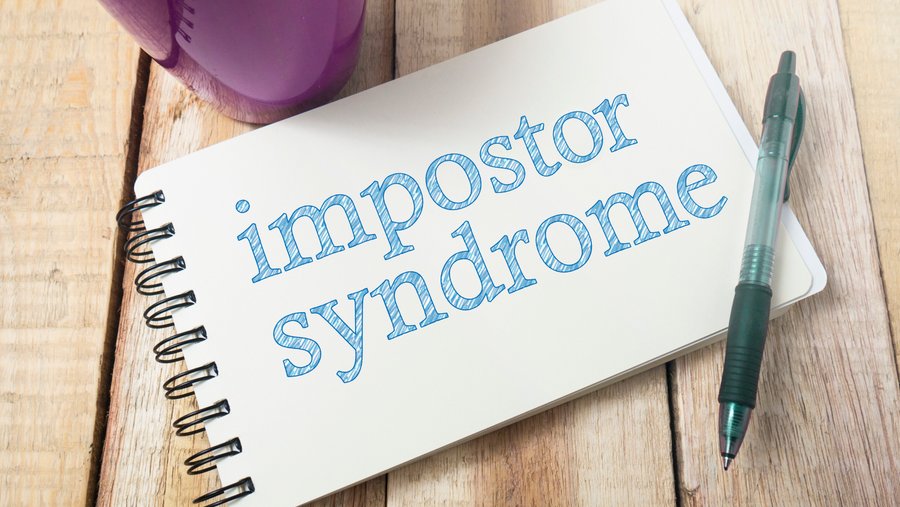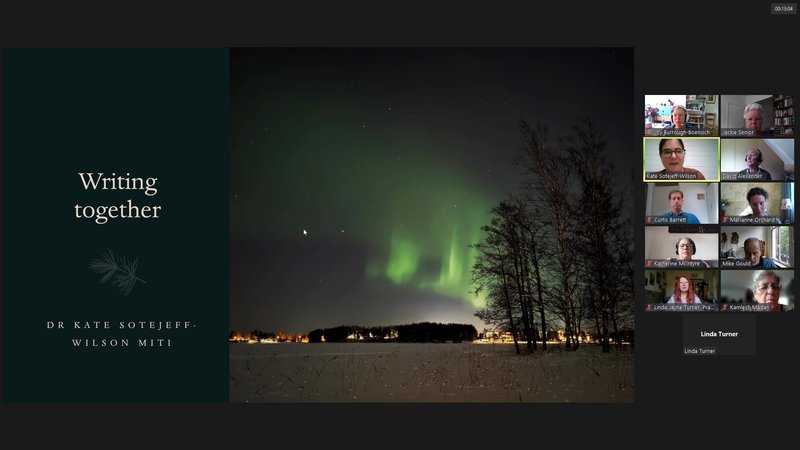
UniSIG report: Kate Sotejeff-Wilson on social writing: ‘Call it a meeting’
At the UniSIG meeting on 1 July 2022, Kate Sotejeff-Wilson talked about her experience of social writing with academics. Kate is a translator and editor, and she also facilitates writing retreats.
Social writing, Kate explained, is when a group of people get together, either online or offline, to write. The writers set goals together, the facilitator tells the group when to start writing and everyone works on their own project until the facilitator tells them to stop. The group then discusses how the writing went.
Kate mentioned a few things social writing is not: a workshop, in that you don’t critique one another’s writing; a boot camp, in that support is more important than productivity; teaching, in that the facilitator is a peer; and a competition, in that the writers are companions rather than competitors.
Who might benefit from social writing? Anyone, said Kate. Academics come to her retreats but so too do creative writers, and they inspire one another. ‘Someone who’s not involved in your work can see things you can’t see yourself.’ Translators could also try social writing, she added, because it gives you the chance to find your own voice and separate your voice from the author’s.
‘Can the writers be writing in different languages?’ Joy Burrough-Boenisch asked.
‘Yes,’ said Kate. Her social writing retreats are in Finnish and English. ‘I’m like a flight attendant: I stand there and say, “Let’s start writing,” in both languages.’
Why might people want to try social writing? Time, space and community, said Kate. Social writing gives you time to focus and the space to create. And as a community you share a commitment to write. You’re away from distractions such as your phone, social media and email. You set a goal – Kate gave the example of 500 words – and share how it went afterwards. ‘You’ll be amazed how much you get done.’
Kate gave three examples of how to go about social writing: informal writing with colleagues, through a professional organization (eg, MET’s Humanities and Social Science special interest group) and structured social writing (eg, a retreat).
Then it was time to discuss the ideal location for social writing, whether online or in person is better and whether social writing would work in the Netherlands. Would people be willing to travel? Would they do as the facilitator says? Would they be willing to pay? Would it be a good idea to limit numbers?
Start small, was Kate’s advice, and find out what works. Start meeting online or in a café and move on to booking a venue if people are interested. For academics, one of the draws of social writing is being able to devote time to writing, away from other responsibilities like teaching and supervision. ‘Schedule social writing,’ said Kate. ‘Call it a meeting!’
About Kate-Sotejeff-Wilson
Dr Kate Sotejeff-Wilson translates from Finnish, German and Polish into English at KSW Translations. She also edits in English for academic and multilingual writers. She facilitates writing retreats online and in person at Ridge Writing Retreats. She was born in Wales and did her history PhD research in London, Berlin, Poznań and Warsaw. Now she is also a Finn and has lived in Finland since 2012. She is chair of Nordic Editors and Translators.

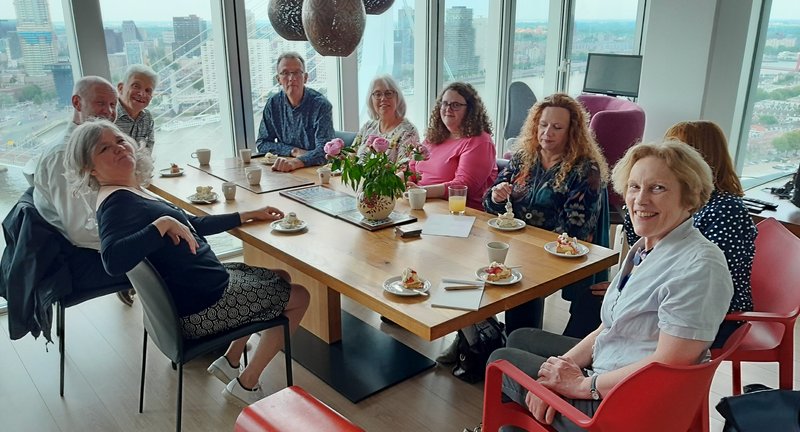
Suzanne Rietveld writes:
On 26 March 2022, I attended the online AGM to see what was happening at SENSE and to meet some of my colleagues. Someone mentioned that the new members seemed less active than expected. This was the moment that I wanted to contribute to the discussion. I explained that this reduced activity should be reviewed within the context of the Covid situation. I told the other members that I registered with SENSE in January 2020 and was eager to see what kind of people I would meet, and what options there would be to learn and interact with mindlike colleagues. All this was disturbed by several lockdowns and restrictions. So, the new members were not less active by choice but by the circumstances of the last two years.
I wanted to put my money where my mouth was and volunteered to host the Zuid Holland SIG on 31 May 2022, advertising the event with the great views from my apartment in De Rotterdam! The event needed a theme, so I decided to give the attendees some tips and tricks on subtitling. That was quite scary, I must confess. Providing the view and the catering was something I was used to, but preparing a talk about subtitling was a challenge because I am not used to speaking in public and I was not 100% sure that I was the right person to share my knowledge.
So, after the invitation was posted online and the first attendees started to sign up, I started to prepare my presentation. I assumed that most of the colleagues would not be experienced with subtitling, other than an odd job in Word, and that some of them would be familiar with the discussion about the specialized skills involved. I wanted to explain more about the technical side of the profession and started my presentation by explaining that my training consisted of a 10-week course of 2 hours per week at ITV Utrecht. So not something I could share within half an hour.
The main issue with subtitling is the fact that reading a sentence takes longer than listening to a sentence, leading to restrictions in reading speed and the number of characters per second. This, combined with a limit in characters per line, often leads to the need to compact the title's content without losing the conveyed message. I use Subtitle Edit myself and showed its settings such as characters per second (around 14–16) and the title's length (between 1 and 8 seconds and with a maximum of 40 characters per line).
I also explained that I prefer to 'spot' the titles by eye instead of by ear. I use the waveform that comes with every MP4 file to do so. The waveform is a graph that shows the speaker's volume and therefore is very useful to mark the start and end of a spoken sentence. Depending on the length and structure of the sentence, you decide how many titles you will need for this particular sentence.
We discussed the ways to shorten the titles, such as leaving out repetitions, stop words, adjectives, adverbials, quantifiers and introductory phrases. The conclusion was that we should only compact the title if this is really necessary. In the end, the afternoon went very well. We all fitted around my table (11 people) and enjoyed the cakes from the local bakery. We got to know each other better, and everyone seemed happy with the shared information.
The overall message was that a subtitle has to convey the right message, and the reader should be able to finish reading the title before it disappears off-screen. Yes, subtitling involves special skills, but don't be afraid to give it a go if a task comes up and offers some flexibility on time spent, and in the worst case, to ask a friend. I proofread and subtitle in English and Dutch 😊
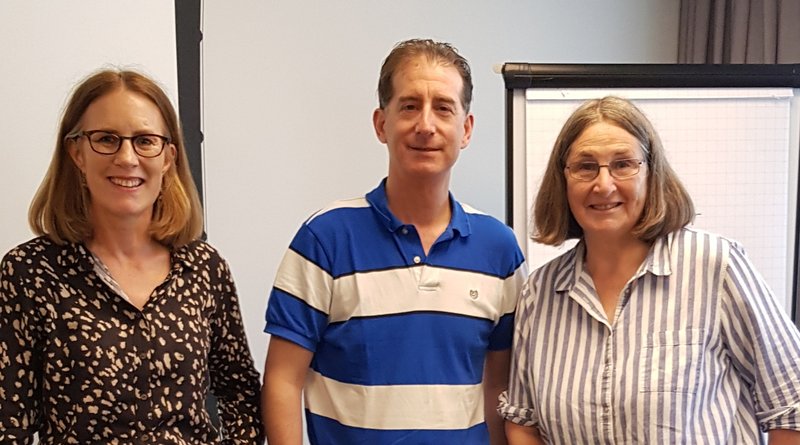
All together again: a summary of the SENSEMed workshop in Utrecht
On 11 June, after 27 long months of Zooming, SENSEMed members finally met in person in Utrecht for a one-day workshop on working with medical texts. Daphne Visser-Lees kicked off with a lively session on translating medical texts from Dutch into English. She explained which texts might need expert medical knowledge to translate (such as case reports and articles) and which ones probably don’t (leaflets for patients, medical insurance documents). She then led us through two translation exercises. The first highlighted common terminology issues we might face when translating medical texts from Dutch into English – for example, Hernia typically refers to a herniated or slipped disc in Dutch whereas it generally means an abdominal hernia in English. The second explained how to decipher and translate case notes from a Dutch GP (not always – or never – easy!). Daphne’s extensive medical experience serves her well when tackling these difficult jobs and we were all grateful for the opportunity to learn from her knowledge and expertise.
Sally Hill and Curtis Barrett were up next with their editing slam. Sally and Curtis had both edited an abstract from a medical research article and presented and explained their changes sentence by sentence. This was an engaging session with plenty of questions and input from the audience. Sally and Curtis had both improved the clarity and readability of the text with their changes – but they did not always agree on what changes were best. This session highlighted just how subjective editing can be and that there is never one right solution to a difficult sentence. It also highlighted how we need to be aware of changes in scientific style and keep in mind that our own preferences (such as whether to use the Oxford comma or italicize Latin words) may not align with the style guide our client has to follow. Sally and Curtis finished up by giving a useful summary of what they do before starting an editing project and before delivering an edited file, both of which involve careful and specific communication with the client. A very enlightening session overall.
After a tea break, Sally was up again to talk to us about medical writing. Sally moved from freelance to in-house work last year after accepting a job as a senior scientific writer for the biotech company Merus. The goal of her talk was clear: to make us aware that medical writing exists. Job done. She explained what kind of texts medical writers are typically asked to produce (broadly divided into regulatory writing and medical communications) and what skills a medical writer should have (writing skills, scientific expertise, document expertise, and project management skills). To highlight how important (and complicated!) project management can be for a medical writer, Sally led us through a short exercise where we had to list the things we would need to consider before developing a timeline for a proposed writing project. The session was informative and inspiring, and Sally may well have succeeded in recruiting some future medical editors into her fold.
The participants were all grateful to Curtis, Daphne and Sally for taking the time and trouble to organize such a great workshop. We were all delighted to see each other in person again and are looking forward to many more such events in the future!
SENSE’s Annual General Meeting (AGM) is always held at the end of March. It is when the Society’s members get to hear what the Executive Committee (EC), the Special Interest Groups (SIGs) and various volunteer teams have been up to. We approve the previous year’s finances, approve the budget for the coming year, thank outgoing EC members and vote in new blood. We also thank the other volunteers who have been offering their time and help – often behind the scenes. In pre-pandemic times, the AGM was also a great opportunity to meet new members and catch up with each other at the coffee machine outside the meeting room.
Whether or not you attended this year’s online AGM, if you’ve been paying attention you will know that I was recently elected as SENSE’s Chair. For me it’s a great honour and, since we did not have a dedicated chairperson last year, this will put the EC in a stronger position as it steers the Society out of the pandemic. I’m sure that, like me, many of you are keen to start meeting up in person again. In this, we will be ably assisted by the two other people just elected to the EC: Curtis Barrett as the new Treasurer and Maaike Meijer as the new CPD Coordinator.
Back in time
Becoming Chair has reminded me just how far I’ve come personally within SENSE. It seems not so long ago that I was new to the profession, very much in awe of the experience and knowledge of other SENSErs. Back in 2009, I had left my job as a biology teacher to become a freelance medical translator. I had no language or translation or editing qualifications, and precious little experience – I felt like such an impostor! Who was I to expect to be paid for translating or editing? Surely others were much better at it? What were other SENSE members going to think of someone like me?
First Forum post
It was not long after I joined that, with some trepidation, I posted my first terminology question on the members’ Forum, which in those days was an email-based system where your question got sent to the entire membership. I must have spent about three hours composing a 228-word email asking whether I should use the -ise or -ize spelling in translated textbooks for Dutch bilingual secondary schools. I was so afraid of making a mistake, or sounding stupid, or asking something so darned obvious I’d be laughed out of town. But of course, I needn’t have worried. Fourteen friendly SENSE members took the trouble to reply and offer their advice and opinions, which greatly helped me to decide – if you’re curious, I went with -ise spelling.
Increased visibility
At the time, although I was still very much a starter in the translation and editing world, this positive experience made me realize that other members might be more approachable than I thought. And with time, I also gained enough confidence to offer my own opinion on questions asked by others. In fact, a science-related question that I was able to answer led to someone asking me to help teach a course in scientific writing. That was the first of several such courses that I ended up teaching at Dutch universities, and all thanks to SENSE; not to mention all the other translation and editing work that came in through word-of-mouth referrals.
Don’t be shy!
Fast forward 13 years, and I’m no longer a starter and no longer a freelancer, but still a keen and active member of SENSE. Now I have made it all the way to Chair of the Society, I feel much less of an impostor. And in fact that’s my main message: if you’re new to SENSE and perhaps lacking in confidence, I want to encourage you to get out of your comfort zone like I did and connect with other members. The pandemic has naturally prevented in-person networking for a couple of years, but until that picks up again, you could consider posting something on our closed Forum, attending a SIG meeting, or volunteering your time for SENSE. That way, when you attend your first live SENSE workshop, not everyone will be a stranger. For introverts – or in fact for many of us who have been unable to attend professional events during the pandemic – it can be quite stressful to turn up not knowing anyone. And I’m speaking from experience.
Of course, as I’ve mentioned before, volunteering for a professional organization is an excellent way to network with others and showcase your knowledge and experience, which the Society will be glad to make use of. And if you are a freelancer or have your own business, it’s free marketing! You can read more about how I used networking to build my business in an article I wrote for SENSE back in 2016.
Back to in-person events
The newly composed EC is already hard at work. The first EC meeting is scheduled in the first half of April, with a more comprehensive meeting at the end of May. One of the topics we are already discussing is of course in-person meetings – where, how, and when we are going to get together as members of the Society. I sincerely hope that SENSE will soon be able to offer you a programme of both offline and online events. This includes the SIG meetings which are often a first point of contact for new members. If you are interested in setting up a new SIG or helping an existing SIG to arrange meetings, the EC is available to help in any way we can.
I hope to meet many of you in person sometime soon. In the meantime, if you have a question or would like to share your thoughts, do feel free to drop me a line at chair@sense-online.nl.
|
Blog post by: Sally Hill LinkedIn: sally-hill-nl Twitter: SciTexts |
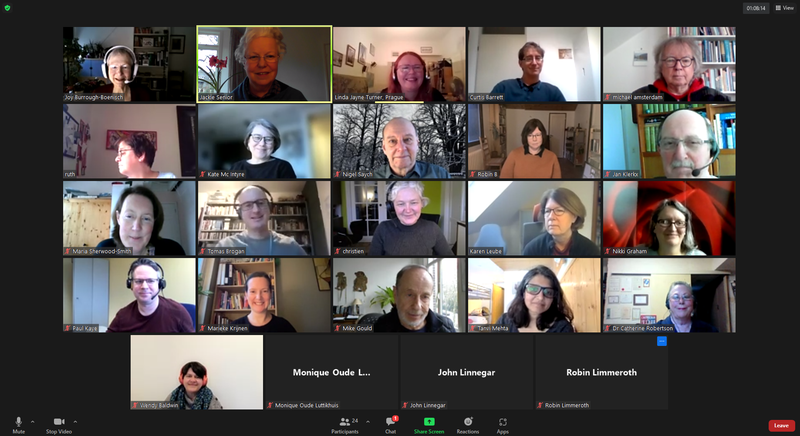
At the 18 February UniSIG meeting, SENSE member Linda Jayne Turner talked about her experience working for clients in academia in Germany and the Czech Republic. A teaching job at Charles University brought Linda to Prague in 2004, and while she has remained there, she also has many clients in Germany, where she lived previously. She mostly edits journal articles written by academics to be submitted to journals (mainly in the social sciences); she also edits colleagues’ English translations from German and Czech.
In her talk, Linda touched on some of the differences between working for clients in the two countries. In general, she thinks her Czech clients are more diffident about their prowess in English and more relaxed about deadlines. Her German academic clients pay higher rates and expect to be invoiced per hour’s work (that’s generally equivalent to editing about 1000 words), whereas in the Czech Republic she is expected to charge per page (assuming 1800 characters per page), but can also charge an hourly rate in some cases. Her German clients often have to request bids from three language professionals, but don’t always go for the cheapest, preferring instead to give the assignment to Linda, whose work they trust and appreciate. Invoices issued to German universities should ideally be paid into German banks to avoid additional paperwork, so Linda has kept her bank account in Germany.
It seems that the bugbear in both countries is Kafkaesque bureaucracy. Although Kafka’s depiction of the Czech establishment arises from his own experience of the system in Prague imposed in the days of the Austro-Hungarian Empire, Linda thinks present-day German bureaucracy is even more convoluted.
Linda makes a point of visiting Germany several times a year, under normal circumstances, and when she does, she contacts her clients in advance to invite them to meet up with her. These informal meetings are usually at the end of the working day and take place in a café, restaurant or bar. Chatting over coffee, a meal or a drink is a good way to get to know more about clients and to get useful feedback from them. It also makes it easier to deal with any subsequent issues that might arise while working together.
At this lively UniSIG meeting there was plenty of input from the 24 attendees. It was pointed out that in Germany and the Netherlands, agencies corner editing and translation work through aggressive marketing, and the texts they supply to their university clients are sometimes in poor English. Linda’s mention of her arrangements for receiving payment from German clients sparked recommendations for companies to use for receiving payments from non-euro clients: PayPal, Wise (formerly TransferWise) and Stripe (cheaper than Paypal).
Other blog articles
-
Tutoring in the UK – challenges and rewards
Written by Monique Oude Luttikhuis
-
Technical writing – a report from the coalface
Written by Hans van Bemmelen
-
SENSE Special Interest Groups ‒ Meet the SIG SenseMed
Written by Paula Arellano Geoffroy
-
Draftsmith – a suite of AI tools for editors and writers from the makers of PerfectIt
Written by Susan Jenkins
-
The plagiarism allegations against ex-Harvard president explained
Written by Nancy du Plessis
-
The relationship between yoga and work
Written by Anne Hodgkinson
-
DeepL and machine translation
Written by Jenny Zonneveld
-
Microcopy: snippets of text have a huge impact
Written by Kees Kranendonk
-
On business websites: Promotion, privacy and padlocks
Written by Linda Comyns
-
SENSE demographics 2023
Written by Paula Arellano Geoffroy
-
SENSE ‒ A name and a meaning
Written by Paula Arellano Geoffroy
-
Meet Heather Sills
Written by Paula Arellano Geoffroy
-
SENSE Professional Development Day 2023
Written by Jasper Pauwels and Tomas Brogan
-
Conservation volunteering – Where work and leisure pursuits meet
Written by Hans van Bemmelen
-
Southern SIG – Favourite reads of 2023
Written by Jasper Pauwels
-
Teamwork says ‘goodbye’
Written by Paula Arellano Geoffroy
-
Extraordinary Susan Massotty
Written by Paula Arellano Geoffroy
-
SENSE Summer Social 2023
Written by Becky Tomas
-
Meet Dara Colwell
Written by Paula Arellano Geoffroy
-
Rachel Pierce on ChatGPT: ‘Caveats, best practices and use cases for language professionals’
Written by Susan Jenkins
-
My first year as Chair
Written by Sally Hill
-
Writing a guide for the CIEP
Written by Claire Bacon
-
Michael Dallas and his exceptional Van Dale supplement
Written by Paula Arellano Geoffroy
-
The challenges of international editing
Written by Taylor Steed
-
The WBTR and SENSE
Written by Anne Hodgkinson
-
In conversation with Sarah Foster
Written by Paula Arellano Geoffroy
-
Academic copy-editing and writing in Ukraine: From censorship to enlightenment
Written by Tomas Brogan
-
Making optimal use of MS Word
Written by Maaike Meijer
-
Up close and personal: My first in-person Annual General Meeting
Written by Naomi Gilchrist
-
UniSIG report: 10 February 2023 – Dealing with Chinese and Southeast Asian clients in academia
Written by Michelle Mellion
-
Three questions for Maha El-Metwally
Written by Maaike Meijer
-
SENSE Ed Report: 9 December 2022 – Teaching Writing to Chinese Students
Written by David Barick
-
Four things I learnt about SENSE as a new member
Written by Tomas Brogan
-
Setting prices and beating impostor syndrome with Susie Jackson
Written by Justa Hopma
-
Southern SIG Report: Lunch recap
Written by Jasper Pauwels
-
Editing and proofreading – how to get it right
Written by Sally Hill
-
Training SIG report: first meeting
Written by Stephen Johnston
-
UniSIG Report: Artificial Intelligence with Writefull
Written by Adam Frick
-
Utrecht SIG Report (9 November 2022): How do we translate?
Written by Anne Hodgkinson
-
Three questions for Susie Jackson
Written by Maaike Meijer
-
Let’s talk about Simplified English
Written by Jenny Zonneveld
-
SENSE Summer Social, 20 August 2022
Written by Joanna Bouma
-
Paul Rees Osborn: engaging storyteller
Written by Mike Gould
-
What’s going on among Dutch translators and interpreters?
Written by Jasper Pauwels
-
Utrecht SIG Report: 13 July 2022
Written by Jenny Zonneveld
-
Tips and tricks for developing a marketing mindset
Written by Nandini Bedi
-
UniSIG Report: 1 July 2022
Written by Marianne Orchard
-
Zuid-Holland SIG Report: 31 May 2022 in Rotterdam
Written by Suzanne Rietveld
-
SENSEMed Report: June 2022 workshop in Utrecht
Written by Claire Bacon
-
Overcoming impostor syndrome
Written by Sally Hill
-
Dutch translation of All God’s Dangers
Written by Frans Kooymans
-
UniSIG Report: Editing for researchers in Germany and the Czech Republic
Written by Joy Burrough-Boenisch
-
UniSIG report: Student, proofreader and lecturer perspectives on proofreading practices
Written by Alison Gibbs
-
UniSIG report: From telling to showing – editing personal grant applications
Written by Sally Johnson
-
Southern SIG report: on using MS Word shortcuts to boost productivity
Written by Jasper Pauwels
-
Five things I learned from my editing courses
Written by Marieke Krijnen
-
[PDD 2021 session recap] Intercultural business communication
Written by Rebecca Reddin
-
8 October UniSIG meeting report: Prof Nigel Harwood on proofreading students' texts
Written by Joy Burrough-Boenisch, Jae Evans, Jackie Senior
-
[PDD 2021 session recap] Spanish wine and translation: what could they possibly have in common?
Written by Anne Hodgkinson
-
How to quote for jobs: part 3
Written by Sally Hill
-
[PDD 2021 session recap] The freedom of freelancing
Written by Yuven Muniandy
-
How to quote for jobs: part 2
Written by Sally Hill
-
Sizzling Summer Series recap: Terminology Extraction and Management
Written by Jackie Senior
-
SENSE Summer Social: The wordsmith challenge!
Written by Naomi Gilchrist
-
Sizzling Summer Series recap: applying Plain Language for accessible, user-friendly texts
Written by Daphne Visser-Lees
-
How to quote for jobs: part 1
Written by Sally Hill
-
Sizzling Summer Series recap: Excel tips for self-employed language professionals
Written by Kay Dixon
-
Editing made easier: PerfectIt teams up with CMOS
Written by Alison Gibbs
-
Sizzling Summer Series recap: Macros by the tourist route
Written by Marieke Krijnen
-
Utrecht SIG report: book swap and pancakes at Theehuis Rhijnauwen
Written by Jenny Zonneveld
-
Sign up for the SENSE Professional Development Days!
Written by John Linnegar
-
UniSIG report: Academic writing support at the University of Twente
Written by Claire Bacon
-
Sizzling Summer Series recap: formatting with Word Styles
Written by Claire Bacon
-
Summer tips from the Southern SIG
Written by Linda Comyns
-
Sizzling Summer Workshops recap: search engine optimization (SEO) for translators
Written by Jasper Pauwels
-
Tech SIG: converting PDFs to editable files
Written by Samuel Murray
-
Translating museum catalogues: there's an art to it!
Written by Jenny Zonneveld
-
Five good practices for revising translations
Written by Jenny Zonneveld
-
Starter’s SIG: Making LinkedIn work for you
Written by Julia Sandford-Cooke
-
Introverts with superpowers: discovering natural productivity
Written by Sally Hill
-
How to handle rapidly changing terminology when editing scientific texts: SenseMed meets online
Written by Claire Bacon
-
How to be a monolingual Anglosplaining jerk
Written by Alison Edwards
-
SIG report: The Southern SIG on the Ides of March
Written by Jasper Pauwels
-
A Starter’s Guide to Machine Translation Post-Editing: What to consider when considering post-editing?
Written by Jasper Pauwels
-
From freelance language consultant to in-house scientific writer
Written by Claire Bacon
-
Tech SIG report: Steven Segaert on GDPR
Written by Susan Jenkins
-
Julie Uusinarkaus on revising translations: let it (mostly) be
Written by Maris van der Laak
-
Tech tips: moving to a new computer
Written by Hans van Bemmelen
-
CPD tips and tricks for editors
Written by Claire Bacon
-
Let's get started: how-to guide for new SENSE members
Written by Anne Oosthuizen, Martina Abagnale and Danielle Carter
-
UniSIG meeting report: Lisa Muszynski on the University of Helsinki’s Language Services
Written by Tanya Barben
-
Starters SIG on resolutions for 2021
Written by Maaike Leenders
-
SENSE New Year’s Borrel 2021
Written by Maaike Leenders
-
Busting the myths of financial translation
Written by Carla Bakkum
-
Hazel Baker on academic editing in Australia
Written by Joy Burrough-Boenisch
-
REFOCUS - REBOUND – REPEAT – RECAP
Written by Carla Bakkum and Francis Cox
-
Starters SIG: personal branding with Sarah Notley
Written by Kerry Gilchrist
-
Recap: Brian Mossop’s Best Practices for Revising Translations workshop
Written by Jasper Pauwels
-
Plain Language style and the 'gamut of choices'
Written by Theresa Truax-Gischler
-
Recap: UniSIG meeting 6 November
Written by Tom Wigham
-
Professional development and networking at the CIEP conference
Written by Claire Bacon and Kate Sotejeff-Wilson
-
24 November: Southern SIG returned!
Written by Jasper Pauwels
-
Recap: Language interference workshop by Joy Burrough-Boenisch
Written by Mike Gould
-
HUMANKIND - an interview with translator Erica Moore (part 2)
Written by Claire Koers and Erica Moore
-
HUMANKIND - an interview with translator Erica Moore (part 1)
Written by Claire Koers and Erica Moore
-
Starters SIG: tips and strategies to find clients
Written by Rossella Squillace
-
Review: Stretch & Tone workshop series a roaring success
Written by Lizzie Keane
-
SIGs in the spotlight: TechSIG
Written by Ashley Cowles
-
A popular scientific writing course moves online
Written by Claire Bacon and Sally Hill
-
Co-working: does it make SENSE?
Written by Lloyd Bingham
-
Recap: the thinking behind the words
Written by Cathy Scott
-
SENSE Virtual Quiz Night - from a newbie perspective
Written by Natalie Bowler
-
Applying adjectives with aplomb
Written by John Linnegar
-
Blogging for clients
Written by Danielle Carter and Anne Oosthuizen
-
SIG Far North on Zoom
Written by Kate McIntyre
-
Jubilee Workshop series: Writers' Stretch & Tone
Written by John Linnegar
-
SIGs in the spotlight: Starters SIG
Written by Ashley Cowles
-
SIGs in the spotlight: Eastern SIG
Written by Ashley Cowles
-
How mentoring helped me kickstart my translation career
Written by Martina Abagnale
-
End of an (editing) era
Written by Claire Bacon
-
Interpreting in times of coronavirus
Written by Ammerins Moss-de Boer
-
Recap: UniSIG end-of-term meeting
Written by Joy Burrough
-
SIGs in the Spotlight: Copywriting SIG
Written by Ashley Cowles
-
How volunteering for SENSE helped me land my current job
Written by Marianne Orchard
-
Editing in the era of Covid-19: How I take care of my mental and physical health
Written by Marieke Krijnen
-
On the importance of back-ups
Written by Hans van Bemmelen
-
Making SENSE
Written by Ashley Cowles
-
SIGs in the spotlight: Zuid-Holland SIG
Written by Ashley Cowles
-
Heavy lifting at the Utrecht SIG meeting
Written by Anne Hodgkinson
-
The Ghost Economy
Written by Mike Gould
-
SIGs in the Spotlight: FINLEGSIG
Written by Ashley Cowles
-
My experience with the SENSE teachers’ meeting on Zoom
Written by Ann Bless
-
Lockdown with kids - part 2
Written by Claire Bacon
-
Dr. Strange Times (or how I learned to stop worrying and love ‘the Zoom’)
Written by Stephen Johnston
-
Lockdown with kids - part 1
Written by Claire Bacon
-
SENSE 2020 Conference goes online!
Written by Matthew Curlewis & John Linnegar
-
How it all began: looking back on the first days of SENSE
Written by Jackie Senior
-
6 April: Eastern SIG Editing Slam
Written by Ruth Davies
-
SIGs in the spotlight: SENSE Ed
Written by Ashley Cowles
-
Utrecht SIG March meeting
Written by Anne Hodgkinson
-
Meet our new EC members!
Written by Mike Gould
-
22 January SIG Far North meeting recap
Written by Kate McIntyre
-
20 February SenseMed meeting recap
Written by Curtis Barrett
-
SIGs in the spotlight: UniSIG
Written by Ashley Cowles
-
MiRoR conference recap
Written by David Barick
-
UniSIG meeting recap: The English language challenge in academic publishing
Written by Kathy Jastrzebski
-
SIGS in the spotlight: Utrecht SIG
Written by Ashley Cowles
-
2020 Conference preview: introducing the SENSE presenters
Written by Ashley Cowles
-
The Write Stuff recap: making translations sing
Written by Anne Hodgkinson
-
We tolk, you listen
Written by Ammerins Moss-de Boer
-
SIGs in the spotlight: SenseMed
Written by Ashley Cowles
-
2020 Conference: location, location, location...
Written by Nigel Saych
-
28 March 2020: SENSE Annual General Meeting at Kargadoor Utrecht
Written by Dave Thomas
-
Academic writing with UniSIG and Ed SIG
Written by Marianne Orchard and Jackie Senior
-
Celebrating 5 years of NEaT
Written by John Linnegar & Theresa Truax-Gischler
-
Renew your membership for 2020!
Written by Claire Koers
-
AAME Seminar: Dutch taxes explained
Written by Francis Cox
-
Six questions for... Ros Schwartz
Written by Jenny Zonneveld
-
Your editorial armoury
Written by John Linnegar
-
FINLEGSIG meeting on 14 November
Written by Cathy Scott
-
Tales from DRONGO language festival
Written by Daphne Visser-Lees
-
Takeaways from the VZV fall symposium
Written by Ammerins Moss-de Boer
-
2019 Annual Dinner: all aboard!
Written by Ashley Cowles
-
Takeaways from PZO: Zelfstandig 3.0
Written by Claire Koers
-
Reminder: submit your proposal for the 2020 Conference!
Written by Ashley Cowles
-
Upcoming CPD events
Written by John Linnegar
-
Reflections on METM19
Written by Jenny Zonneveld
-
2019 Professional Development Day Recap
Written by Marieke Krijnen
-
Eastern SIG Autumn borrel
Written by Ragini Werner
-
11 October: Free Lecture in Amersfoort
Written by Lloyd Bingham
-
SfEP 2019: Comedy, conversation, celebration
Written by Claire Bacon
-
UniSIG report: season kick-off
Written by Joy Burrough-Boenisch
-
21 September: Professional Development Day!
Written by Ashley Cowles
-
Summer Social 2019
Written by Ashley Cowles
-
FINLEGSIG report: tax for translators
Written by Carla Bakkum
-
Eastern SIG editing slam
Written by Serena Lyon
-
PerfectIt 4: highly satisfying to use
Written by Maartje Gorte
-
Save the literary translator!
Written by Frans Kooymans
-
Utrecht SIG: translate what it says?
Written by Maartje Gorte
-
SENSE Jubilee 2020: Get Ready!
Written by John Linnegar
-
PZO: Did you know?
Written by Claire Koers
-
UniSIG report: Do online editing services have a place in your client portfolio?
Written by Angelique van den Heuvel
-
Editing tips from The Subversive Copy Editor
Written by Claire Bacon
-
Eastern SIG informal meeting 12 April 2019
Written by Susan Hunt
-
Utrecht SIG report 13 March
Written by Anne Hodgkinson
-
Eastern SIG meeting 28 February: Breggsit
Written by Eline Tuijn
-
Book review: Health-related scientific articles in the 21st century: Give readers nuggets!
Written by Claire Bacon
-
SENSE Utrecht translation SIG meeting 9 January
Written by Anne Hodgkinson
-
A funny thing happened on the way to the UniSIG meeting...
Written by Sally Hill
-
UniSIG: a lively encore for Maria, to a full house
Written by John Linnegar
-
Eastern SIG borrel
Written by Kumar Jamdagni
-
Contrasting learning methods: SENSE Ed SIG
Written by David Barick
-
Business goals for 2019
Written by Claire Bacon
-
2018 in review: the year in numbers for SENSE
Written by Marianne Orchard
-
Utrecht Translation SIG: dealing with challenging clients
Written by Anne Hodgkinson
-
Freestyling at the SENSE UniSIG meeting
Written by Marijn Moltzer
-
What can we learn from our mystery shopper experiments
Written by Tony Parr
-
MET 2018 conference: SENSE impressions
Written by Marianne Orchard
-
Time management tips for language practitioners
Written by Samuel Murray
-
PerfectIt workshop review
Written by Ruth Davies
-
SfEP Course Review: Copy-editing Headway
Written by Claire Bacon
-
Sound, camera, action!
Written by Francis Cox
-
The n-word raises its ugly head again
Written by Sally Hill
-
Blog posts people will want to read
Written by Claire Bacon
-
Jackie Senior retires
Written by Sally Hill
-
SENSE 2018: MET member impressions
Written by Marianne Orchard
-
SENSE 2018: delegate impressions
Written by Marianne Orchard
-
The future of editing, translating and interpreting
Written by Claire Bacon
-
SENSE 2018: gushing enthusiasm
Written by Kathy Jastrzebski
-
SENSE 2018: clarity vs. gobbledygook
Written by Marianne Orchard
-
PerfectIt Cloud review
Written by Michelle Luijben-Marks
-
Workshop review: writing readable blogs
Written by Marianne Orchard
-
SENSE 2018: meet the presenters
Written by Marianne Orchard
-
Light, medium and heavy editing workshop
Written by Marianne Orchard
-
Medical writing workshop
Written by Marianne Orchard
-
Unpaywall: free scholarly articles
Written by Claire Bacon
-
GDPR for freelancers
Written by Sally Hill
-
Data Privacy workshop review
Written by Marianne Orchard
-
New EC: recipe for a team
Written by Marianne Orchard
-
Blog workshop: find your hook
Written by Marianne Orchard
-
Building an editing business
Written by Claire Bacon
-
GUEST BLOG – Not English, not Dutch, but a language apart
Written by Rogier Willems
